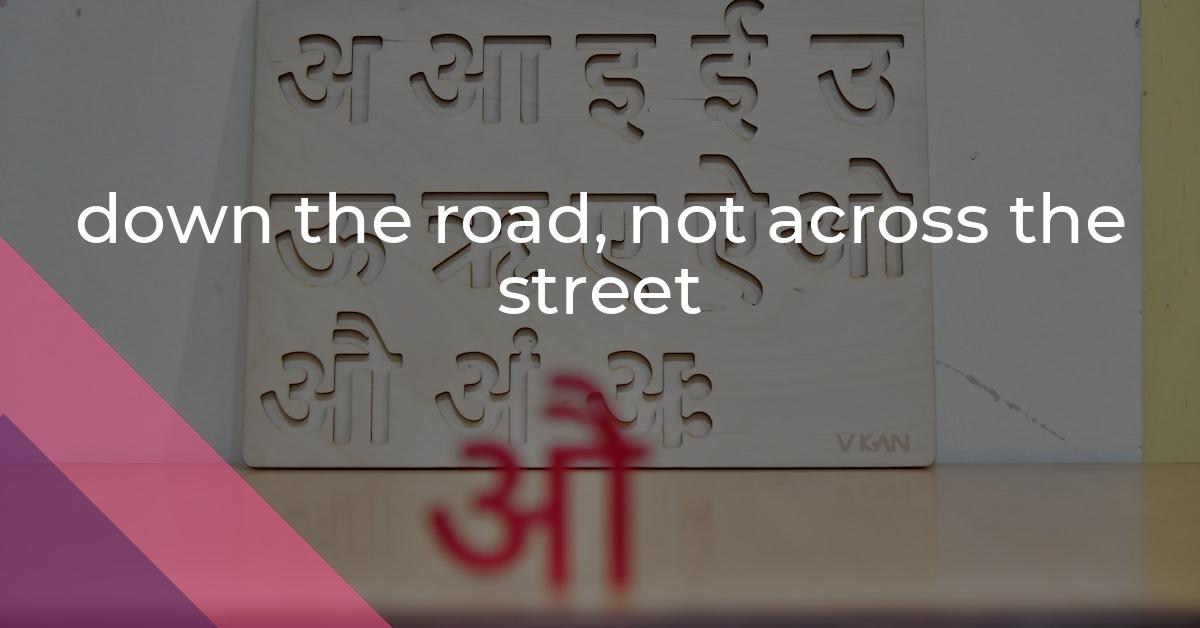down the road, not across the street: Idiom Meaning and Origin
What does ‘down the road, not across the street’ mean?
The idiom "down the road, not across the street" is a metaphorical expression suggesting that one should face their problems head-on rather than seeking an easy way out. It implies that a more direct approach will lead to better solutions or outcomes in the long run.

Idiom Explorer
The idiom "road less traveled" means choosing an unconventional path or taking a less popular route, often in life or decision-making, different from the majority or mainstream choices.
The idiom "kick the can down the road" means to delay or postpone addressing a problem or making a decision, often because it is difficult or unpopular to do so at the present time.
The idiom "in the long term" refers to a period of time that is far into the future, usually indicating a result or consequence that will be realized after a significant amount of time or over an extended period. It emphasizes the importance of considering the potential outcomes or impacts over a longer timeframe rather than focusing solely on short-term effects.
The idiom "in the long run" means considering the overall or ultimate outcome or result of a situation, especially over a period of time, rather than focusing on immediate or short-term effects.
The idiom "in the face of" means to confront or deal with something difficult or challenging. It implies facing a problem or obstacle directly and not being intimidated or deterred by it.
The idiom "high road" means to take the morally right or responsible approach in a situation, often choosing to remain calm and respectful rather than resorting to aggression or retaliation.
The idiom "head south" means to go in the wrong direction or to experience a decline or failure.
The idiom "go the way of" means to follow the same path or fate as something or someone, usually implying that the outcome will not be favorable or will result in obsolescence or extinction.
The idiom "go down the wrong way" means to do or say something that is inappropriate, offensive or causes discomfort to others.
The Meaning Unveiled
The idiom "down the road, not across the street" is a commonly used phrase in the United States. It originated in the late 20th century, although the exact details of its creation are uncertain. This idiom has gained popularity over the years and is now a recognizable phrase in American English.
The literal interpretation of this idiom relates to self-harm and suicide. It suggests that if someone were to choose self-harm, it would be preferable to cut "down the road" (along the length of the arm) rather than "across the street" (perpendicular to the arm). The idiom implies that a vertical cut along the veins on the arm would be less lethal and more easily treatable than a horizontal cut that can result in severe damage or death.
It's important to note that this idiom is not an endorsement or glorification of self-harm or suicide. Rather, it is a darkly humorous and sarcastic response to statements or actions that may indicate emotional distress or a premature surrender to life's challenges.
Given the sensitive nature of this idiom, it's crucial to exercise caution and consider its potential impact on individuals who have personal experiences with self-harm or suicide. The metaphorical usage of this idiom should be approached with sensitivity and empathy.
Despite its grim connotations, this idiom offers an opportunity to reflect on the complexities of human emotions and struggles, as well as the unique ways we express ourselves through language. It serves as a reminder of the importance of acknowledging and supporting individuals who may be going through difficult times, while also embracing the power of language to convey deeper meanings beyond face value.
The idiom "down the road" is closely related to "down the road, not across the street." It is commonly used to refer to events or situations that will happen or be resolved in the future. For example, someone might say, "I don't know when, but down the road, we'll find a solution to this problem." This idiom suggests that even though a solution may not be immediate, there is hope for resolution in the future.
Another related idiom is "go down the road." This phrase is used to express the act of physically traveling or progressing forward. For instance, someone might say, "Let's go down the road to the next town and see what they have to offer." This idiom indicates a journey or exploration towards something new or different.
A similar idiom is "down the track," which is often used in a figurative sense to describe events or outcomes that will occur in the future. For instance, someone might say, "Down the track, we'll see the results of our hard work." This idiom emphasizes the notion that time will reveal the consequences or rewards of one's actions.
The idiom "down the line" is another related phrase that is used to describe events or circumstances that will happen in the future. For example, someone might say, "We may not see immediate changes, but down the line, we'll reap the benefits." This idiom suggests that patience and perseverance will eventually lead to positive outcomes.
While these idioms are distinct from "down the road, not across the street" in terms of their literal meanings, they all share a common thread of looking towards the future and considering the potential outcomes or resolutions that lie ahead.
Exploring the intricacies of idiomatic expressions like these invites us to delve into the origins and evolution of language. It allows us to appreciate how idioms shape our communication and understanding of the world. Their linguistic significance goes beyond literal meanings, offering a unique lens through which we can express complex emotions and concepts.
Example usage
Examples of how the idiom "down the road, not across the street" can be used in a sentence:
- "When faced with difficulties at work, it's important to remember that the solution might be down the road, not across the street."
- "She decided to take a different approach to solving her relationship problems, realizing that the answers lie down the road, not across the street."
- "Instead of giving up and seeking instant gratification, he chose to pursue his long-term goals down the road, not across the street."
More "SelfHarm" idioms
We missed the mark - nothing found.



